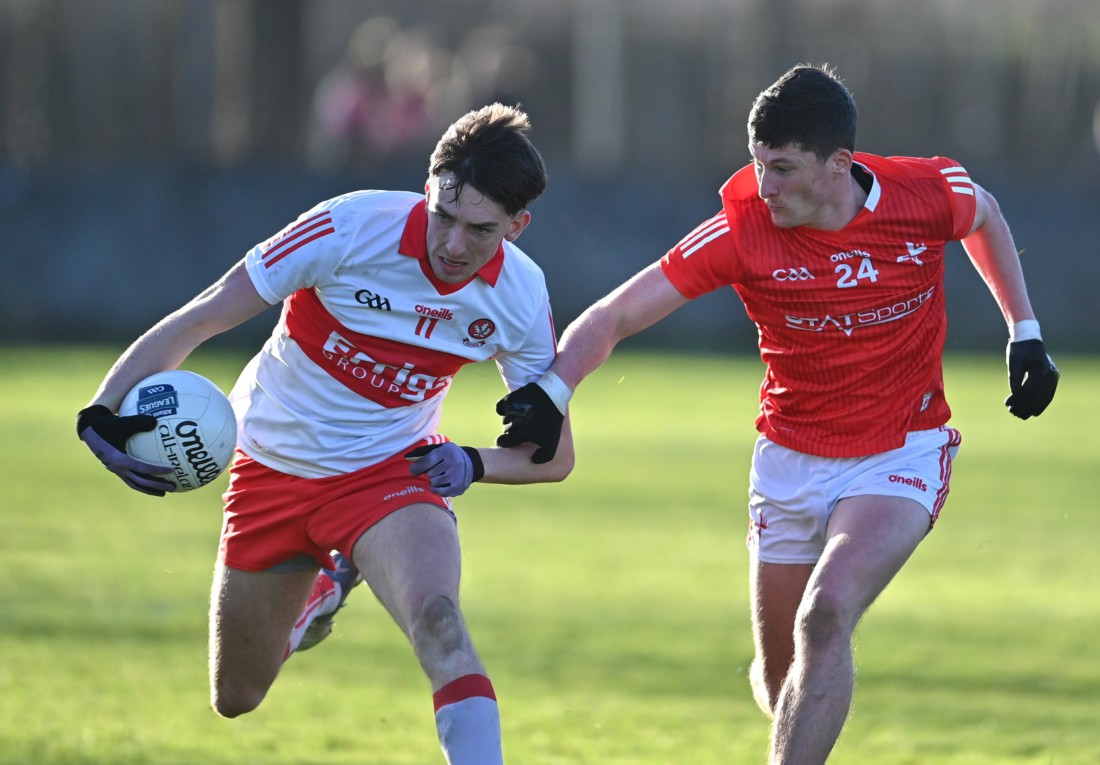IT was week two of the National Football League at the weekend and I got to take in two games. On Saturday evening I watched the Division Two clash between Down and Antrim in Newry and then on Sunday I travelled up to Ardee for the Division Two meeting of Louth and Derry.
Both games were hugely enjoyable with all four teams bringing different strategies, tactics and kick-out plays to the table, but one thing you can guarantee in this sport – or in fact any team sport – you can have all the systems, tactics, strategies in the world but if you don’t bring the intensity or the fight you will have nothing.
On Sunday, Mickey Harte set Louth up with a deep lying defensive structure that invited Derry onto them and worked on turning ball over in the Louth scoring zone, which is a high-risk strategy against teams with as good a place kicker as Shane McGuigan because if the discipline in the tackle is not nailed on, you could concede a lot of needless points. The level of defensive intensity and discipline is absolutely critical in a system like this.
One of the trademarks of the great Dublin six in a row team was their tenacity in the tackle, their ability to hunt the man consistently and continually in possession of the ball is an art form but also commands not just physical discipline but a huge level of psychological discipline and drive.
To be 10-plus points up with just under 10 minutes to go and to be still hassling, harrying, and tackling the ball carrier in numbers was a joy to behold.
Going back five years ago to 2018, Dublin and Tyrone contested that particular All-Ireland final. It was the final where the Red Hands raced into a 5-1 lead after 20 minutes before Dublin intercepted a Niall Morgan kick-out and went on to fire in a scoring blitz of 2-4 without reply to end any hopes of an upset.
The stand-out statistic from that year though was the tackle stats and tackle count of both sides, Dublin had held the record in tackle stats for one game with a count of 58, only ahead of Tyrone who in their ‘Super Eight’ decider away to Donegal managed 57.
Now the definition of a tackle in the GAA rule book wasn’t the definition of how these stats were accumulated but it was simple evidence to show, despite being the most organised teams in the country, they were also the hardest working – no secret!
Armagh v Mayo late on became a game of inches. It became a real battle, proper championship intensity, helped of course by the tight venue of the Athletic Grounds. It creates a bear-pit atmosphere and trying to analyse a game like that and particularly the last quarter is near impossible.
For me, the real analyst lies with the intensity, fire, and fight both teams bring to a game. Words like financial doping have been bandied about in the media recently in soccer and some have pointed a similar finger to the great Dublin six in-a-row team, but they were supremely well coached, had serious organisation and an unbelievable hunger, drive and desire!
There is no doubt that tackling is a skill, and if you can coach the proper technique to your players it will give them the belief and confidence to execute the skill of tackling effectively during a game.
When it comes to coaching the tackle, consider the following five Ds:
Delay – Try to slow the player in possession down, break their momentum, force them to alter their feet or body which in turn will help you execute the tackle more efficiently.
Deny – suffocate the space of the player on the ball; invade his personal space ultimately denying him sufficient room to manoeuvre.
Dispossess – legally try to strip the ball from your opponent, wait for the player to make a play, ie solo or a bounce then pounce with quick hands and eyes on the ball!
Develop – One of the most under coached aspects of the tackle, what happens after you actually win the ball back, you must think transitions, defence immediately to attack and when you are facilitating tackling exercises in training create a situation where the tackler if he wins the ball must develop the play!
Drive and Desire – The will has to come from within, consistently praising and rewarding the small things like turnovers and tackles rather than goals and points may help develop a better mindset in your players.
Receive quality journalism wherever you are, on any device. Keep up to date from the comfort of your own home with a digital subscription.
Any time | Any place | Anywhere












